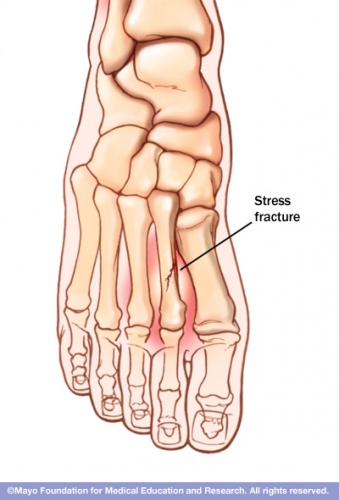We both had a good laugh after he explained that there actually exists a category of runner in organized running called “The Clydesdales.” As you might have already guessed, it is an exclusive club for runners over a certain size/weight. Feel free to draw any/all conclusions about why yours truly is an honorary member, as per my doctor. Let’s just assume that we will never see a man with my frame winning the Boston Marathon anytime soon. ‘Nough said?
The reason for my visit to the podiatrist was because my foot hurt. I had trained for and run a 5K race and didn’t even know I had injured it until about a week later. It turns out that I had a stress fracture in one of my metatarsals (the long thin bones spanning from your toes to the arch of your foot). The cause of stress fractures is very simple: overuse coupled with rapid changes in running conditions and/or surfaces. I was guilty of all of the above. Add to that my less-than-marathonesque frame and I’m a Clydesdale just waiting for injury!
Now, the strange thing about stress fractures is that, as was the case with mine, even a trained physician can’t always see them on x-rays. In fact, they often diagnose stress fractures “clinically”, through physical examination only. As my podiatrist said during the visit, they are serious business because if left untreated, they can easily turn into full-blown fractures.
Stress fractures are interesting injuries because nobody can actually see them, yet they are the cause of significant pain. There are usually no outward indications that an injury has occurred. Left untreated the pain continues to worsen, which is the human body telling the athlete to take a break before a much worse injury occurs. Thankfully, the prognosis for recovery is very good as bones tend to heal predictably. The key to recovery is strict adherence to doctor’s orders. In my case, “No running for eight to ten weeks.”
This blog occurred to me while running (I’m mostly healed now and elated to be back on the roads again - woo hoo). I thought about how in the spiritual life we all suffer stress fractures that are invisible to others. They, too, are the result of overuse and rapidly changing conditions. Most believers nowadays are pretty sore from plugging on in a world that despises Christ. And most are guilty of not heeding the warning signs.
They made me caretaker of the vineyards,
But I have not taken care of my own vineyard.
— Song of Solomon 1:6
We believers in Christ must learn to avoid “overuse”. We must tend to our own vineyards, taking time off as necessary to recuperate, allowing the Word to wash over us, to mend us. Even Jesus took time away from His ministry to tend to His own vineyard from time to time. ”After [Jesus] had sent the crowds away, He went up on the mountain by Himself to pray; and when it was evening, He was there alone” (Matthew 14:23). The prescription for healing spiritual stress fractures is found in the Word.
Pleasant words are a honeycomb,
Sweet to the soul and healing to the bones.
There is a way which seems right to a man,
But its end is the way of death.
— Proverbs 16:24-25
Solomon was a wise man who gave a lot of sound counsel, as is the case above. The world tells us that if we want to excel in this life we must push all the more, sacrificing life and limb for the sake of heroics. But this is folly - the Bible says as much, “There is a way which seems right to a man, but its end is the way of death” (v25).
As is the case when we go to the doctor’s office suffering with a stress fracture, we must be the ones to accept our pain and articulate it openly. In the spiritual life, we do this how Jesus did - we take time out of our busy schedules and we pray, ”casting all your anxiety on Him, because He cares for you” (1 Peter 5:7).
If you find yourself sidelined with a stress fracture, take your medicine and sit it out. If you push any harder, you might break something, incurring a much longer healing process and likely greater pain as well. It isn’t worth it, trust me - been there, done that. Learn to recognize the symptoms as they arise and don’t be arrogant and ignore them. God has put certain safeguards in place to warn us when we’re overdoing it. Being our Creator, we ought to listen to Him, right?
If you’re a “Clydesdale” like me, be extra careful when you’re out there “[running] in such a way that you may win” (1 Corinthians 9:24). It’s great to run the race, but overtraining that results in injury means you can’t run at all! What good is that? You’re not even competing at that point! Pace yourself and never be afraid to listen to your senses. God gave them to you for this very purpose!
Enjoy the race, my friends...we only run it once!
Love in Christ,
Ed Collins
